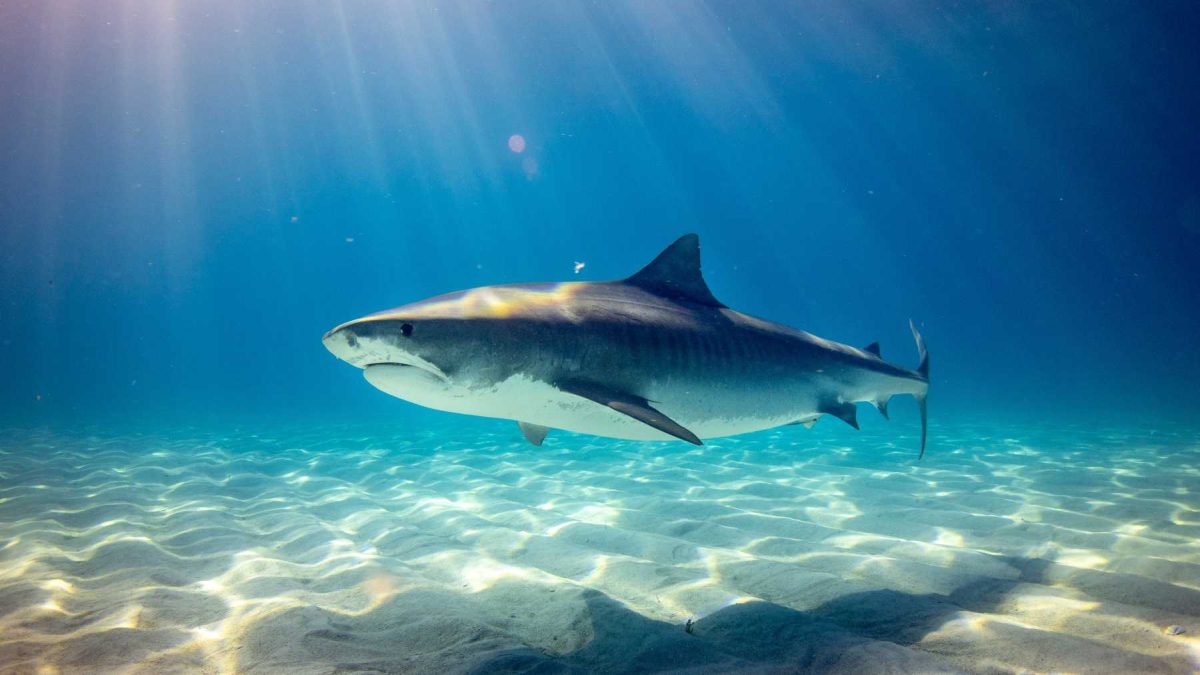As high schoolers’ summer break comes to a close, students begin reminiscing about warm days spent freely with common summer activities. While longingly staring out the window of their U.S. history class, they start daydreaming.
Many imagine a sunny beach with clear water when, suddenly, a shark fin peaks out of the water. Their hearts begin to race and their palms grow clammy, all while their feet are planted firmly in the warm sand, far, far away from the curious shark. During this daydream, they were never in any imminent danger, but an alarming reaction was displayed, leaving many to wonder why or what led to sharks across the world being known as cold-blooded killers.
Since the release of the monumental film JAWS on June 20, 1975, over 100 millions sharks have been killed globally per year, many becoming endangered, due to finning, a process where the shark’s fin is sliced off and the rest of the still-living-body is discarded back into the ocean to eventually drown to death. Even more sharks became hated and unreasonably feared because of the implications this film portrayed.
Throughout the film, a five-ton, 35-foot-long, shark targets a touristy town in New England, seemingly going to great lengths to kill any person who attempts to capture it. The movie depicts the shark as an intentional killer and almost makes it seem human in its motives. As many know, films frequently prove detrimental to specific groups of people, or in this case, animals, because of the ideas they suggest. JAWS is no different, unnecessary fears were formed based on a fictional character, and unfortunate misconceptions have continued even 30 years later.
Although the amount of shark attacks per year has doubled in the past five years, it is not because sharks’ diets have suddenly changed from mainly fish to humans, but ultimately, because of climate change. The chain reaction begins with the warming of the water, which displaces species of both sharks and fish that must live at specific temperatures to thrive. As those fish, or seals, migrate to better-suited waters, sharks follow in need of food. Now, sharks often find themselves in highly populated areas by humans, which relates directly to the uptick in attacks. In addition, there has been an increase in annual intense storms, which decreases the amount of visibility in the ocean. Little visibility makes it even harder for sharks to differentiate humans from seals and other prey, which is another major reason that an attack may happen.
Despite the fact that the number of shark attacks has jumped recently, contrary to popular belief, the chance of a person getting bitten is still incredibly low. In reality, you are more likely to be killed by a falling coconut, die riding a jet ski, or by the use of a tanning bed. There are many, many things that could happen instead of being bitten, but 30% of Americans still hold a relatively unfounded fear of sharks.
Since the entertainment industry originated many years ago, it has influenced our society in numerous ways. In this situation, movies like JAWS or The Shallows, which again portray the shark as a mindless killer and are watched by millions, have allowed for an unfair negative light to settle over sharks worldwide. There is no need to eliminate movies that paint sharks as predators, but there is an imminent demand to push for viewers to separate fiction from reality, allowing for viewers to see sharks for the powerful fish they are. Once the unjust stereotypes that have been placed on sharks are refuted, many might feel less anxiety towards the ocean and find themselves venturing towards the water more often, aware of the sharks that may swim near them but not deathly afraid.
In addition, sharks are essential to the ocean ecosystem, and without them, a catastrophic domino effect would follow. Unfortunately, the populations of many species have rapidly decreased over the years. Organizations like PETA, Blue Ocean Society, and Oceana educate people about sharks and their risk factors but also preserve their ocean habitat by raising money. These websites are easily accessible to both students and the public on most search engines.
The next time you find yourself daydreaming about a nice day at the beach that gets interrupted by a shark swimming many yards away, remember that sharks are not the mindless killers that they are sold to be, but instead curious beings meant to be admired.










Nancy Slagg • Aug 30, 2024 at 11:04 pm
Interesting article, well researched and colorful! I enjoyed it!